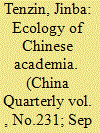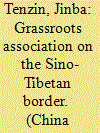| Srl | Item |
| 1 |
ID:
155672


|
|
|
|
|
| Summary/Abstract |
While Chinese academic excellence is gaining increasing international recognition, plagiarism, corruption, nepotism and other negative practices are reportedly rampant in academia in China. Many point the finger at fundamental flaws within the tizhi, the highly structured Chinese socio-political system. I propose re-examining Chinese academia and its practices by applying and expanding Pierre Bourdieu's notion of field as this framework helps to identify the predicament of the “deep water” in which Chinese scholars and institutes find themselves. The four fields I outline – ideological, quasi-official, fame–profit and guanxi fields – spotlight academic practices with “Chinese characteristics.” I elaborate on my own experiences and reflections as both an insider and outsider to these practices, a position which I refer to as a third-eye perspective. I argue that despite the constraints of the “deep water,” the field-oriented angle of investigation reveals that the depths and types of “deep water” vary from one institute to another and also that the internally generated ongoing initiatives promise a step-by-step transformation in Chinese academia. To provoke further thought, I contend that the Chinese case is both a non-exception and alternative to the Western (and other) practices. In so doing, I call for a balanced perspective to re-examine Chinese academic ecology.
|
|
|
|
|
|
|
|
|
|
|
|
|
|
|
|
| 2 |
ID:
131951


|
|
|
|
|
| Publication |
2014.
|
| Summary/Abstract |
This article investigates the role of the Moluo Tourism Association in Suopo township, Danba county, Sichuan. It examines its organization, internal structure and objectives, and explores the concerns of Tibetan elites and villagers and their strategies for advancing their political and other goals in an officially sanctioned framework. The research shows that the association resembles a "state-led civil society" as its membership and agendas exhibit the strong will of the local state; nevertheless, it still manages to carve a space for expressing negative opinions towards the local authorities, pursuing the "Eastern Queendom" cause and following its own agendas. The dynamic and nuanced interactions between the association and township show that state-society relations in China are situated in a complex and convoluted landscape which has not yet been fully explored in the China field. Furthermore, the article brings to light the divergent interests and positions of the association members as well as the heterogeneity of Suopo society proper. It concludes with a brief discussion of the prospects for an enhanced engagement of ethnic research with broader China studies.
|
|
|
|
|
|
|
|
|
|
|
|
|
|
|
|